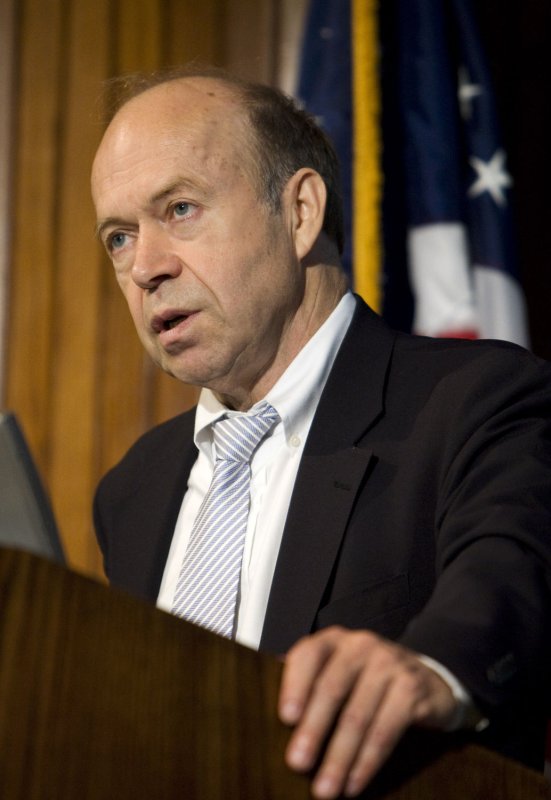Dr. James E. Hansen, director of the NASA Goddard Institute for Space Studies, speaks at National Press Club to mark the 20th anniversary of the "Hansen Hearing," the Senate Energy Committee's 1988 hearing on climate change, which marked the first time a top climate scientist declared that global temperatures had risen beyond the range of natural variability in Washington on June 23, 2008. (UPI Photo/Patrick D. McDermott) |
License Photo
SYDNEY, March 4 (UPI) -- A climate scientist often referred to as the "godfather of climate change" said Australia's massive coal exports are almost equivalent to being a drug dealer to the world.
In kicking off his visit to Australia for a series of lectures on nuclear energy, James Hansen, director of NASA's Goddard Institute for Space Studies, had a message for the world's largest exporter of coal: Phase it out.
Australia exported about 60 percent of its coal production in 2008 -- about 268.5 million tons -- accounting for 25 percent of global coal exports.
Hansen said pollution from fossil fuels was killing 1 million people a year and that the planet was doomed if emissions were not dealt with, The Age reports.
Coal-fired power stations, known for high carbon dioxide emissions, generate about 80 percent of Australia's electricity.
Nuclear power, Hansen said, is an inevitable part of the solution for climate change.
"Renewable energy and nuclear power together can solve the air and water problem, as well as the climate problem,'' he said.
Hansen noted that he would be open to Australia making a commitment to move to 100 percent renewable energy but renewable sources cannot be relied on alone. It becomes a choice between coal and nuclear for base-load power, he said.
But while a Nielsen poll last October indicated 49 percent of Australians support nuclear energy, Australian Prime Minister Kevin Rudd has rejected the prospect of nuclear power for his country, saying last month that coal's importance will remain "huge" until 2050.
Touching on the Australian government's embattled emissions trading scheme regarded by Rudd as the best way to tackle climate change, Hansen said it was a "non-solution."
The Australian Senate rejected ETS legislation in December for a second time. Further debate on the legislation is postponed until May.
Hansen said he supported the Green Party's plan for an interim carbon tax starting at $23 a ton for two years while agreement was reached on the best type of carbon pricing. He noted that this "Plan B" is in line with his support of industries having to pay a carbon price without access to offsets through a carbon market.
''If we had a democracy where decisions were based on the public's best interest, then that would be taken up in a heartbeat," Hansen said, the Sydney Morning Herald reports. But "neither of the major parties gets it -- or they don't want to get it.''
As for Australia's opposition party, Hansen said it has not accepted the idea of man-made climate change.
''I don't intend to be telling Australia what they should do for their energy source except that they can't continue to burn coal without screwing everybody -- including my grandchildren," he said.
Hansen's book, "Storms of My Grandchildren: The Truth About the Coming Climate Catastrophe and Our Last Chance to Save Humanity," was published in December.















